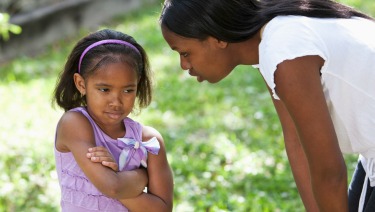at what age is it appropriate to discipline a child
Family Life
What's the Best Fashion to Discipline My Kid?


Folio Content
Every bit a parent, one of your jobs to teach your child to behave. Information technology's a job that takes time and patience. But, it helps to larn the effective and good for you field of study strategies.
Here are some tips from the American University of Pediatrics (AAP) on the best ways to help your child learn acceptable behavior as they abound.
ten Good for you Bailiwick Strategies That Work
The AAP recommends positive discipline strategies that effectively teach children to manage their behavior and keep them from damage while promoting salubrious development. These include:
-
Show and tell. Teach children right from wrong with calm words and actions. Model behaviors you would like to run across in your children.
-
Ready limits. Accept clear and consistent rules your children can follow. Be sure to explain these rules in age-advisable terms they can sympathize.
-
Give consequences. Calmly and firmly explicate the consequences if they don't behave. For example, tell her that if she does non choice up her toys, yous will put them away for the rest of the day. Be prepared to follow through correct away. Don't give in by giving them back after a few minutes. But remember, never take away something your child truly needs, such as a meal.
-
Hear them out. Listening is of import. Let your child finish the story before helping solve the problem. Watch for times when misbehavior has a pattern, like if your child is feeling jealous. Talk with your child about this rather than just giving consequences.
-
Requite them your attention. The near powerful tool for effective discipline is attention—to reinforce skillful behaviors and discourage others. Remember, all children desire their parent'due south attending.
-
Catch them being expert. Children need to know when they do something bad--and when they exercise something practiced. Notice good beliefs and indicate it out, praising success and expert tries. Be specific (for example, "Wow, you did a adept task putting that toy away!").
-
Know when not to respond. As long as your child isn't doing something unsafe and gets plenty of attention for proficient behavior, ignoring bad beliefs can be an effective fashion of stopping it. Ignoring bad behavior tin also teach children natural consequences of their deportment. For instance, if your child keeps dropping her cookies on purpose, she will soon have no more cookies left to eat. If she throws and breaks her toy, she volition not exist able to play with it. It volition not exist long before she learns not to drop her cookies and to play carefully with her toys.
-
Be prepared for trouble. Plan ahead for situations when your child might have trouble behaving. Fix them for upcoming activities and how you lot want them to behave.
-
Redirect bad behavior. Sometimes children misbehave because they are bored or don't know whatever ameliorate. Notice something else for your child to do.
-
Telephone call a time-out. A time-out can be especially useful when a specific rule is broken. This discipline tool works best past warning children they will get a fourth dimension out if they don't stop, reminding them what they did wrong in equally few words―and with as piddling emotion―as possible, and removing them from the situation for a pre-prepare length of fourth dimension (1 minute per year of age is a good dominion of thumb). With children who are at least three years old, you lot can endeavor letting their children atomic number 82 their own time-out instead of setting a timer. You can just say, "Go to time out and come back when you feel ready and in control." This strategy, which tin help the child learn and do self-management skills, likewise works well for older children and teens.
Spanking and Harsh Words are Harmful and Don't Work. Here's Why: |
|---|
Learn from Mistakes—Including Your Ain
Think that, every bit a parent, y'all tin can give yourself a time out if you feel out of control. Just make certain your child is in a safe identify, and then give yourself a few minutes to take a few deep breaths, relax or call a friend. When you lot are feeling better, get back to your child, hug each other, and outset over.
If you do not handle a situation well the first time, try non to worry about it. Think about what y'all could take done differently and try to practice information technology the next time. If you experience yous accept made a real mistake in the estrus of the moment, wait to cool down, repent to your child, and explain how you lot will handle the situation in the time to come. Be certain to keep your promise. This gives your child a good model of how to recover from mistakes.
Healthy & Effective Discipline Tips by Age/Stage
Infants |
|
|---|---|
Toddlers |
|
Preschool Age |
|
Gradeschool-Age Children |
|
Adolescents & Teens |
|
Additional Data:
- 15 Tips to Survive the Terrible 3's
-
How to Shape and Manage Your Young Child's Behavior
-
Disciplining Older Children
-
How to Give a Time-Out
-
Effective Subject to Raise Healthy Children (AAP Policy Statement)
Article Body
- Last Updated
- 11/v/2018
- Source
- American Academy of Pediatrics (Copyright © 2018)
The information independent on this Spider web site should not exist used as a substitute for the medical intendance and advice of your pediatrician. In that location may be variations in treatment that your pediatrician may recommend based on private facts and circumstances.
Source: https://www.healthychildren.org/English/family-life/family-dynamics/communication-discipline/Pages/Disciplining-Your-Child.aspx